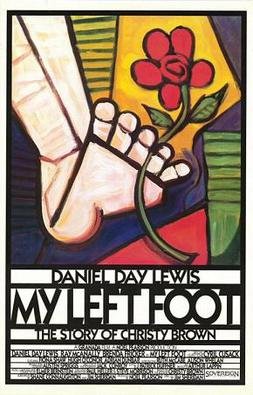Related Research Articles

Cerebral palsy (CP) is a group of movement disorders that appear in early childhood. Signs and symptoms vary among people and over time, but include poor coordination, stiff muscles, weak muscles, and tremors. There may be problems with sensation, vision, hearing, and speech. Often, babies with cerebral palsy do not roll over, sit, crawl or walk as early as other children. Other symptoms may include seizures and problems with thinking or reasoning. While symptoms may get more noticeable over the first years of life, underlying problems do not worsen over time.

Flow My Tears, the Policeman Said is a 1974 science fiction novel by American writer Philip K. Dick. The novel is set in a futuristic dystopia where the United States has become a police state in the aftermath of a Second American Civil War. The story follows genetically enhanced pop singer and television star Jason Taverner who wakes up in a world where he has never existed.

My Left Foot: The Story of Christy Brown is a 1989 biographical comedy-drama film directed by Jim Sheridan adapted by Sheridan and Shane Connaughton from the 1954 memoir by Christy Brown. A co-production of Ireland and the United Kingdom, it stars Daniel Day-Lewis as Brown, an Irish man born with cerebral palsy, who could control only his left foot. Brown grew up in a poor working-class family, and became a writer and artist. Brenda Fricker, Ray McAnally, Hugh O'Conor, Fiona Shaw, and Cyril Cusack are featured in supporting roles.

Edward, My Son is a 1949 British drama film directed by George Cukor for MGM-British Studios that stars Spencer Tracy and Deborah Kerr. The screenplay by Donald Ogden Stewart is based on the 1947 play of the same title by Noel Langley and Robert Morley. The title character is never seen in the movie and montages of celebratory cakes show the passage of time.

Peggy Cummins was an Irish actress, born in Wales, who is best known for her performance in Joseph H. Lewis's Gun Crazy (1950), playing a trigger-happyfemme fatale, who robs banks with her lover. In 2020, she was listed at number 16 on The Irish Times list of Ireland's greatest film actors.

Augmentative and alternative communication (AAC) encompasses the communication methods used to supplement or replace speech or writing for those with impairments in the production or comprehension of spoken or written language. AAC is used by those with a wide range of speech and language impairments, including congenital impairments such as cerebral palsy, intellectual impairment and autism, and acquired conditions such as amyotrophic lateral sclerosis and Parkinson's disease. AAC can be a permanent addition to a person's communication or a temporary aid. Stephen Hawking, probably the best-known user of AAC, had amyotrophic lateral sclerosis, and communicated through a speech-generating device.

Emily Bishop is a fictional character from the British ITV soap opera Coronation Street. Portrayed by Eileen Derbyshire, the character is the longest-standing female character in the serial, having first appeared on-screen during the fourth episode on 21 December 1960, played by an uncredited walk on actress. From January 1961 onwards, she was played by Eileen Derbyshire. Derbyshire announced in November 2015 that she would be taking a retirement from the show and Emily departed on New Year's Day 2016 after 55 years on screen. It was announced on 9 August 2019 that Derbyshire had agreed to briefly reprise the role. She made a brief cameo on 9 October 2019 for Ken Barlow's 80th birthday celebration.
Humana Festival of New American Plays is an internationally renowned festival that celebrates the contemporary American playwright. Produced annually in Louisville, Kentucky by Actors Theatre of Louisville, this festival showcases new theatrical works and draws producers, critics, playwrights, and theatre lovers from around the world. The festival was founded in 1976 by Jon Jory, who was Producing Director of Actors Theatre of Louisville from 1969 to 2000. Since 1979 The Humana Festival has been sponsored by the Humana Foundation which is the philanthropic arm of Humana.

Emily Kirk is a fictional character from the British television soap opera Emmerdale, played by Kate McGregor. She made her first appearance in the episode broadcast on 5 May 1999. Initially portrayed as nervous and naive, Emily lived a sheltered life with her father and lacks social skills, until she takes a job at the local post office. Writers established a relationship between Emily and Butch Dingle. McGregor thought the characters brought out the best in each other.

I Do! I Do! is a musical with a book and lyrics by Tom Jones and music by Harvey Schmidt which is based on the Jan de Hartog play The Fourposter. The two-character story spans 50 years, from 1895 to 1945, as it focuses on the ups and downs experienced by Agnes and Michael throughout their marriage. The set consists solely of their bedroom, dominated by the large fourposter bed in the center of the room.
John Belluso was an American playwright best known for his works focusing on the lives of disabled people. He also directed a writing program for disabled people.

Women on the Verge of a Nervous Breakdown is a musical with music and lyrics by David Yazbek and a book by Jeffrey Lane. Based on the Pedro Almodóvar film Women on the Verge of a Nervous Breakdown (1988), the musical tells the tale of a group of women in late 20th-century Madrid whose relationships with men lead to a tumultuous 48 hours of love, confusion and passion.

Over time, the approach to cerebral palsy management has shifted away from narrow attempts to fix individual physical problems – such as spasticity in a particular limb – to making such treatments part of a larger goal of maximizing the person's independence and community engagement. Much of childhood therapy is aimed at improving gait and walking. Approximately 60% of people with CP are able to walk independently or with aids at adulthood. However, the evidence base for the effectiveness of intervention programs reflecting the philosophy of independence has not yet caught up: effective interventions for body structures and functions have a strong evidence base, but evidence is lacking for effective interventions targeted toward participation, environment, or personal factors. There is also no good evidence to show that an intervention that is effective at the body-specific level will result in an improvement at the activity level, or vice versa. Although such cross-over benefit might happen, not enough high-quality studies have been done to demonstrate it.
"Skins Fire" is a feature-length episode of E4 television series Skins. It aired in two parts in 2013 as part of a specially-commissioned seventh season marking the end of the programme. The first six series of Skins aired from 2007 to 2012, a teen drama focusing on the lives of three separate casts of Bristolian teenagers. While previous stories in the series were teen dramas, "Skins Fire" like other stories in the seventh season revisits characters from the show's first two casts, now facing young adulthood.
The Hard Problem is a play by British playwright Sir Tom Stoppard, first produced in 2015. The title refers to the hard problem of consciousness, which Stoppard defines as having "subjective First Person experiences"; he notes the strangeness in the illusion of consciousness in which, clearly, you have to be conscious to experience.
The Rules of Charity is a 2005 play by the American playwright John Belluso. The play premiered on April 23, 2005, at the Magic Theatre in San Francisco, California. It has since had an Off-Broadway run. The play focuses on a man named Monty with cerebral palsy who uses a wheelchair, and whose adult daughter takes care of him.
Jeeja Ghosh is an Indian disability rights activist. She was born with cerebral palsy, a condition caused by lack of oxygen to the brain either during pregnancy or at the time of delivery.

Sarah Jane McNutt was an American physician, notable as the first woman inducted into the American Neurological Association. McNutt was a founder of the Babies' Hospital in New York City, now known as Morgan Stanley Children's Hospital, along with her sister Dr. Julia G McNutt. Her mentors and co-workers Elizabeth Blackwell and Emily Blackwell were some of the first female physicians in the United States. She focused her work on pediatrics, neurology, and medical education.
References
- ↑ Belluso, John (2006). A Nervous Smile. New York, NY: Dramatists Play Services Inc. ISBN 978-0-8222-2095-4.
- ↑ "Humana Festival of New American Plays - Actors Theatre of Louisville". Actors Theatre of Louisville. Retrieved 2016-04-13.
- ↑ "The Play". A Nervous Smile. Retrieved 2016-04-25.
- ↑ "Notable Productions". A Nervous Smile. Retrieved 2016-04-25.
- ↑ "Communication Boards". Amy Speech & Language Therapy, Inc. Retrieved 2016-04-14.
- ↑ "Institute on Disabilities | Programs | Assistive Technology | PATLL |ECO2 Communication Device". www.ioddev.org. Retrieved 2016-04-14.